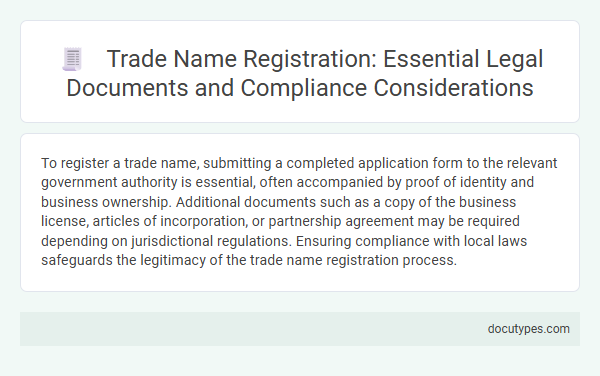To register a trade name, submitting a completed application form to the relevant government authority is essential, often accompanied by proof of identity and business ownership. Additional documents such as a copy of the business license, articles of incorporation, or partnership agreement may be required depending on jurisdictional regulations. Ensuring compliance with local laws safeguards the legitimacy of the trade name registration process.
Introduction to Trade Name Registration
Trade name registration is a crucial step in establishing your business identity in the market. It legally protects the name your business uses to operate and attract customers.
You need specific legal documents to successfully register a trade name, ensuring compliance with local business regulations. The primary document required is an application form submitted to the appropriate government agency or business registry.
Legal Definition of a Trade Name
A trade name is the official name under which a business operates and is recognized in the marketplace. It differs from the legal business name, serving primarily for branding and public identification.
To register a trade name, you typically need to submit a completed application form along with a copy of your business's formation documents. Proof of identity and payment of registration fees may also be required depending on your jurisdiction.
Importance of Registering a Trade Name
Registering a trade name is essential for establishing a unique business identity in the commercial market. The primary legal document required for trade name registration is the completed application form submitted to the relevant government authority, often accompanied by proof of identity and business address. Registering a trade name protects the business from unauthorized use and enhances brand recognition, which is crucial for legal and commercial purposes.
Required Documents for Trade Name Registration
Trade name registration requires specific legal documents to ensure proper identification and protection of the business identity. These documents vary by jurisdiction but generally include proof of identity and business details.
- Application Form - A completed trade name registration application form must be submitted to the relevant authority.
- Proof of Identity - Official identification documents such as a government-issued ID or passport are required to verify the registrant's identity.
- Business Proof Documents - Documents like a business license, partnership deed, or articles of incorporation demonstrate the legal existence of the business entity.
Step-by-Step Registration Process
The primary legal document required for trade name registration is the completed application form provided by the relevant government authority. You must also submit a sworn affidavit verifying the authenticity of the trade name and a copy of a valid government-issued identification. Supporting documents, such as proof of business address and payment receipts, are essential to complete the registration process.
Compliance with State and Local Laws
What legal document is required for trade name registration to ensure compliance with state and local laws? You must file a Trade Name or Doing Business As (DBA) registration form with the appropriate state or county agency. This document verifies your compliance with local regulations and protects your business identity.
Common Legal Pitfalls in Trade Name Registration
Trade name registration requires specific legal documents to establish the legitimacy and exclusivity of a business identity. Understanding common legal pitfalls helps prevent delays and rejections during the registration process.
- Incomplete Application Forms - Submitting trade name registration forms without all required information often results in processing delays or outright rejection.
- Failure to Conduct Name Searches - Overlooking comprehensive trade name availability searches increases the risk of trademark infringement or conflicting registrations.
- Ignoring Jurisdiction Requirements - Neglecting to comply with state or local regulations can invalidate the trade name registration or limit its legal protection.
Renewal and Maintenance Requirements
Renewing and maintaining a trade name registration requires specific legal documents to ensure continued protection. These documents verify active use and compliance with local business regulations.
- Renewal Application - A formal request submitted to the relevant authority to extend the validity of the trade name registration.
- Proof of Use - Documentation such as invoices or advertisements demonstrating the trade name is actively used in commerce.
- Payment of Renewal Fees - Evidence of payment for the renewal process, required to keep the trade name registration active.
Compliance with renewal and maintenance document requirements prevents the cancellation of trade name rights.
Consequences of Non-Compliance
| Legal Document Required for Trade Name Registration | The primary legal document required for trade name registration is the Application for Trade Name Registration, often accompanied by proof of business identity such as a business license, valid ID, and sometimes a certificate of incorporation. Specific requirements vary by jurisdiction but generally include detailed information about the business owner, the trade name, and the nature of the business. |
|---|---|
| Consequences of Non-Compliance | Failure to submit the appropriate legal documents or register your trade name can result in significant legal repercussions. These may include fines, denial of trademark protections, inability to enforce contracts under the trade name, and potential legal disputes with other businesses claiming rights over the name. Non-compliance can undermine your business credibility and restrict your ability to operate legally, risking closure or penalties imposed by regulatory authorities. |
What Legal Document Is Required for Trade Name Registration? Infographic

